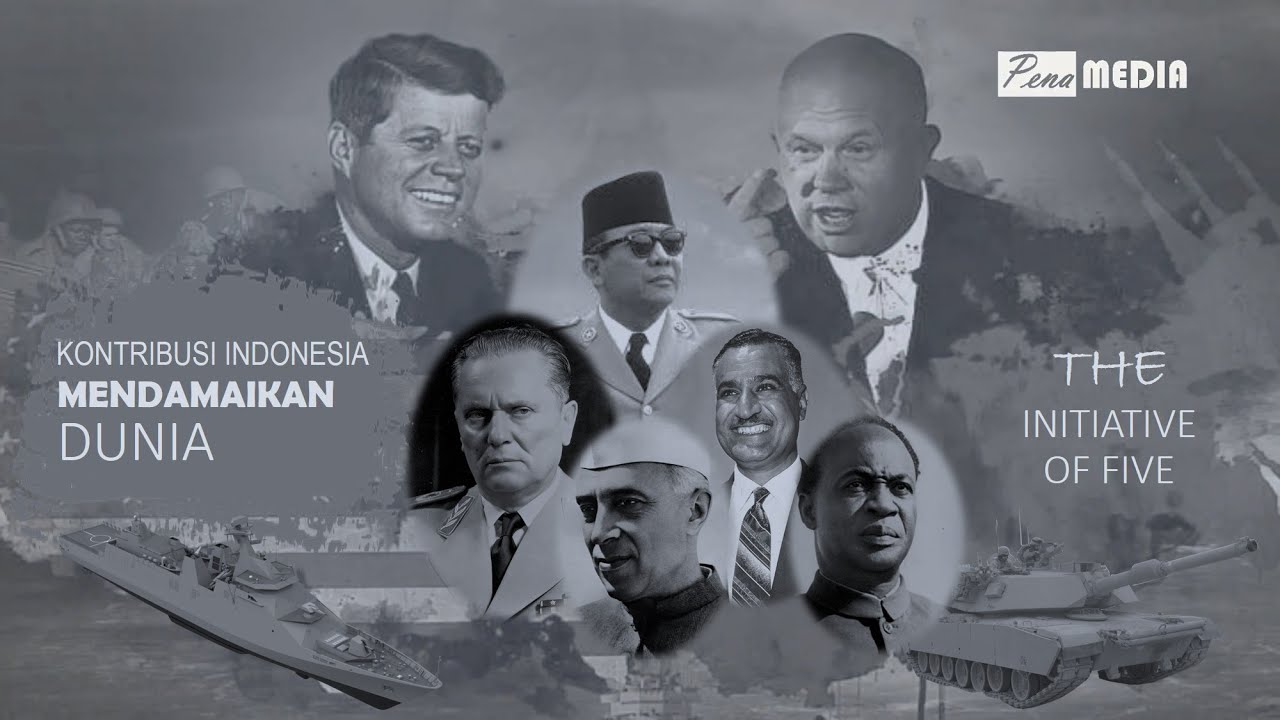PIDATO BUNG KARNO: KAPITALISME, KOMUNISME, IMPERIALISME, KOLONIALISME, DAN NASIONALISME.
Summary
TLDRThe speaker emphasizes Indonesia's commitment to a 'free and active' foreign policy, maintaining neutrality between the two major blocs of the United States and Soviet Union. They highlight the importance of nationalism over colonialism, arguing that nationalism is a force greater than both capitalism and communism. The speaker reflects on the historical rise of independence movements in Asia and Africa, stressing their significance over the atomic bomb. Indonesia’s international relations are marked by a desire to promote coexistence between nations, actively engaging with both capitalist and communist countries while emphasizing national sovereignty and independence.
Takeaways
- 😀 Indonesia adheres to a free and active foreign policy, which remains consistent and does not deviate from the determined line.
- 😀 Indonesia rejects participation in either the capitalist or communist blocs, opting for a neutral stance in international relations.
- 😀 The core global issue is not communism versus capitalism, but nationalism versus imperialism and colonialism.
- 😀 Both capitalist and communist worlds can coexist peacefully, despite occasional tensions, for over 40 years.
- 😀 Nationalism and colonialism are incompatible, with colonialism being viewed as a form of imperialism that annexes other countries.
- 😀 The rise of nationalism, particularly in Asia and Africa, is considered a significant historical phenomenon of the 20th century, greater than the atomic bomb.
- 😀 The emergence of independent national states in Asia and Africa is seen as a defining characteristic of the 20th century.
- 😀 Indonesia's foreign policy promotes coexistence and cooperation, not just between capitalist and communist blocs, but also across nations in general.
- 😀 The President of Indonesia values international trips, not only as a fulfillment of diplomatic invitations but also as an opportunity to gain insights that can benefit Indonesia's development.
- 😀 During a visit to Washington, the Indonesian President emphasized that the trip was not just a ceremonial visit but an exploration of the United States as both a nation and a state of mind.
Q & A
What is the core principle of Indonesia's foreign policy as stated in the speech?
-The core principle of Indonesia's foreign policy, as stated in the speech, is a 'free and active' policy. This policy ensures Indonesia does not align with either of the two major global blocs (capitalist or communist) and instead seeks coexistence and mutual respect between nations.
What does the speaker mean by 'coexistence between nations'?
-By 'coexistence between nations,' the speaker refers to the idea that countries, whether capitalist or communist, can exist side by side without conflict. The emphasis is on active cooperation and peaceful coexistence, not mere tolerance.
How does the speaker differentiate between nationalism and colonialism?
-The speaker suggests that nationalism and colonialism cannot coexist. Nationalism represents the pursuit of independence and self-determination, while colonialism involves the domination and annexation of other nations, creating inherent conflicts between these two ideologies.
What is described as the 'greatest historical reality of the 20th century'?
-The 'greatest historical reality of the 20th century,' according to the speaker, is the rise of nationalism, particularly in Asia and Africa, and the emergence of national states and independence movements in those regions.
What is the speaker's view on the relationship between the capitalist and communist worlds?
-The speaker believes that the capitalist and communist worlds can coexist peacefully, with each system maintaining its identity. Despite occasional conflicts, they can live side by side without necessarily engaging in perpetual conflict.
How does the speaker view the conflict between nationalism and imperialism?
-The speaker asserts that nationalism and imperialism are in direct conflict. While nationalism seeks to promote independence and self-determination, imperialism, which involves the control and domination of other nations, is inherently opposed to these values.
What role does the speaker believe Indonesia plays in international relations?
-The speaker suggests that Indonesia, through its foreign policy of being 'free and active,' plays a pivotal role in promoting coexistence between nations, especially between the capitalist and communist blocs. Indonesia seeks to actively engage with countries from both sides of the ideological divide.
Why does the speaker emphasize the importance of the rise of nationalism in Asia and Africa?
-The speaker emphasizes the rise of nationalism in Asia and Africa as a major force shaping global politics. This phenomenon, he argues, is even more significant than the development of nuclear weapons, as it has fundamentally altered the global balance of power and is central to the survival and identity of nations.
What is the significance of the speaker's travels abroad?
-The speaker's travels abroad are not just for fulfilling invitations but also to understand the global situation, seek experiences, and gather insights that can benefit Indonesia. His travels are framed as part of a broader effort to learn from other nations and apply those lessons to Indonesia's own development.
What does the speaker mean by referring to the United States as a 'state of mind'?
-By calling the United States a 'state of mind,' the speaker suggests that his visit is not just about engaging with the U.S. as a physical country but also about understanding its ideology, values, and broader cultural and political mindset.
Outlines

Этот раздел доступен только подписчикам платных тарифов. Пожалуйста, перейдите на платный тариф для доступа.
Перейти на платный тарифMindmap

Этот раздел доступен только подписчикам платных тарифов. Пожалуйста, перейдите на платный тариф для доступа.
Перейти на платный тарифKeywords

Этот раздел доступен только подписчикам платных тарифов. Пожалуйста, перейдите на платный тариф для доступа.
Перейти на платный тарифHighlights

Этот раздел доступен только подписчикам платных тарифов. Пожалуйста, перейдите на платный тариф для доступа.
Перейти на платный тарифTranscripts

Этот раздел доступен только подписчикам платных тарифов. Пожалуйста, перейдите на платный тариф для доступа.
Перейти на платный тарифПосмотреть больше похожих видео
5.0 / 5 (0 votes)






